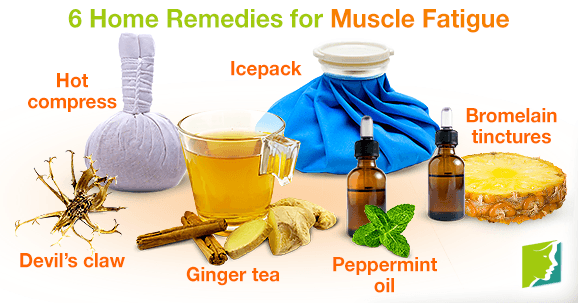Muscle fatigue is a common complaint after strenuous exercise or physically-demanding work. It is characterized by tiredness and pain in specific ligaments, tendons, and fascia (i.e., the soft tissues that connect the bones, muscles, and organs). While muscle pain can be symptomatic of infections and disorders, it is most commonly caused by tension, injury, or overuse of muscles. Muscle fatigue isn't usually a cause for concern, but it can make physical activity uncomfortable or temporarily impossible. Luckily, there are remedies you can prepare at home to help relieve muscle fatigue and discomfort.
Ginger Tea
In both heated and raw forms, ginger is a potent anti-inflammatory herb with pain-relieving effects that have been compared to ibuprofen. Ginger capsules, tea, and extracts can be consumed to relieve discomfort, and topical applications of ginger at the site of pain can also have a deeply soothing effect on fatigued muscles.
Bromelain Tinctures
Bromelain is an enzyme found in the stem and juice of pineapple that can be anti-inflammatory and muscle-relaxing for arthritis patients. Consuming bromelain supplements or applying tinctures topically to painful muscles is beneficial in speeding up recovery from muscle fatigue.
Peppermint Oil
Peppermint is an herb with soothing, pain-relieving effects. Applying peppermint oil topically to aching muscles provides a cooling sensation that also creates heat beneath the surface of the skin, relaxing muscles and reducing pain.
Devil's Claw
The roots of devil's claw - named for the appearance of its fruit - contain active ingredients that reduce arthritic swelling and pain when applied topically. It can also reduce other muscle pain when taken orally.
Ice
In the 24 - 72 hours following the onset of muscle pain, apply a bag of frozen peas, an ice pack, or ice wrapped in cloth to the points of discomfort to reduce swelling and provide immediate pain relief.
Heat
After the first 72 hours of muscle pain, heat is usually more soothing and conducive to speedy muscle recovery. Create a warm, soothing poultice by wrapping raw preparations of the above anti-inflammatory herbs in cloth and infusing in warm water, then applying directly to the point of muscle pain.
It's important to rest while recovering from muscle fatigue. Your body won't improve by rushing into exercise directly after injury or tension. Once your muscles feel stronger, re-introduce exercise to your routine gradually; begin with gentle activities like swimming or walking and increase intensity over time. If your muscle pain occurs alongside other unusual symptoms, is severe, or lasts for longer than a week, it is advisable to see your doctor to identify the cause of the pain and rule out more serious health concerns.
Click on the following link for further information on how to manage this menopausal symptom.
Sources
- Black, C.D. et al. (2010). Ginger (Zingiber officinale) reduces muscle pain caused by eccentric exercise. The Journal of Pain, 11(9), 894-903. doi: 10.1016/j.jpain.2009.12.013
- Light, A.R. , Vierck, C.J. & Light, K.C. (2010). Myalgia and Fatigue. In: Translational Pain Research: from Mouse to Man. Boca Raton, FL: CRC Press. Retrieved from http://www.ncbi.nlm.nih.gov/books/NBK57253/
- National Institutes of Health. (2013). Bromelain. Retrieved April 25, 2014, from http://www.nlm.nih.gov/medlineplus/druginfo/natural/895.html
- Natural Institutes of Health. (2011). Devil's claw. Retrieved April 25, 2014, from http://www.nlm.nih.gov/medlineplus/druginfo/natural/984.html
- National Institutes of Health. (2013). Ginger. Retrieved April 25, 2014, from http://www.nlm.nih.gov/medlineplus/druginfo/natural/961.html
- National Institutes of Health. (2013). Muscle aches: MedlinePlus Medical Encyclopedia. Retrieved April 25, 2014, from http://www.nlm.nih.gov/medlineplus/ency/article/003178.htm
- National Institutes of Health. (2013). Peppermint. Retrieved April 25, 2014, from http://www.nlm.nih.gov/medlineplus/druginfo/natural/705.html




